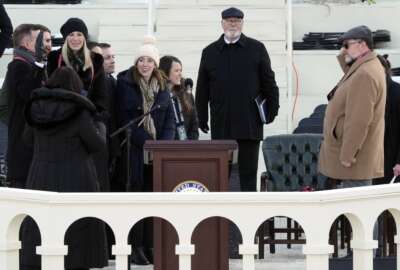Tuesday federal headline – November 3, 2015
In Tuesday's Federal Headlines, the Postal Service inspector general says a private company could process mail faster, letting USPS deliver packages more...
The Federal Headlines is a daily compilation of the stories you hear discussed on the Federal Drive and In Depth radio shows.
- The Postal Service could make more money if it entered an agreement and shared business with a private package carrier. The USPS Inspector General said delivery service would get more efficient. A private company can process mail faster. And the Postal Service can deliver packages more efficiently. The IG said what it calls “co-opetition” could also bring down prices for consumers. (USPS OIG)
- Federal agencies spent over $330 million on advisory committees in 2014. According to a congressional research service report, advisory committees had more than 68,000 members. The costs per committee ranged from $100 to more than $22 million. (FAS)
- The Nuclear Regulatory Commission is joining a growing number of regulatory agencies requiring the reporting of cybersecurity incidents by the industries they oversee.
A final rule published in yesterday’s Federal Register requires nuclear power reactor facilities to alert the NRC within one hour after the discovery of a cyber attack that impacts safety, communications or emergency functions. The final rule is effective starting December 2nd.The NRC has been working on this rule since June 2011. (GPO)
- The Defense Information Systems Agency is looking to build more than resilient infrastructure to help resist cyber attacks. Army Lt. Gen. Alan Lynn, director of DISA, outlined the agency’s priorities at its 2015 Forecast to Industry event. He said DISA would like to work more with private sector companies to become more efficient. Officials say they want to stay ahead of threats by reassessing investments to see how to optimize technology and avoiding redundancy. (Defense Department)
- Director of National Intelligence James Clapper said the CIA did not pull officers from Beijing following the Office of Personnel Management data hack in which many suspect Chinese government hackers played a role. The Washington Post had reported back in September the agency pulled officers as a precaution. Clapper speaking at a Defense One National Security conference said they “have a fair idea of who was behind the data hack.” (Washington Post)
- President Barack Obama wants federal agencies to give job applicants with criminal histories a better look. Speaking at Rutgers University, he declared he was directing OPM to issues guidance on the practice of “banning the box” when making hiring decisions. The ACLU says they applaud the President’s decision, but are urging him to issue an executive order to apply the idea to federal contractors. (ACLU)
- The two NASA officials charged with breaking espionage laws have received their penalties. Glenn Woodell, a former NASA supervisor, who pleaded guilty to violating espionage laws, received six months probation and a $250 fine. His colleague Daniel Jobson had his charges reduced to a misdemeanor and was released without penalty. The two were charged when it was discovered they allowed a Chinese contractor unrestricted access to the NASA Langley Research Center in Virginia. (Scribd)
- Congress made changes to the Homeland Security Act of 2002, passing three amendments yesterday. One of them establishes an insider threat program to investigate threat risks. Another shores up sensitivity level designations of national security positions within DHS. (Congress)
- Congress is finalizing what programs it will cut to make the defense budget fit the parameters of the budget deal signed by President Barack Obama. House Armed Services Committee Chairman Mac Thornberry (R-Texas) said programs of importance will take cuts. Congress needs to take out five billion dollars from the defense authorization bill. Thornberry said the details of what programs are affected will be released soon. (Federal News Radio)
- The General Services Administration and the Veterans Affairs Department are losing key senior executives. Mark Day, GSA’s deputy assistant commissioner in the Integrated Technology Services office in the Federal Acquisition Service, quietly retired Oct. 30. Kathleen Turco, the chief financial officer for the Veterans Health Administration, also announced her plans to retire as of Dec. 30. Day joined the government in 1997 and worked at EPA and HUD along with GSA. Turco has been in the government since 1988. She worked at the IRS, GSA and VA. Another long-time fed who left government in September found a new home. Pete Tseronis, the former Energy Department chief technology officer landed a Deep Water Point consulting. (Federal News Radio)
Copyright © 2025 Federal News Network. All rights reserved. This website is not intended for users located within the European Economic Area.
Related Stories
OPM tells federal workers to plan to telework heading into Inauguration Day
Related Topics





